|
|
|
Sort Order |
|
|
|
Items / Page
|
|
|
|
|
|
|
| Srl | Item |
| 1 |
ID:
172078


|
|
|
|
|
| Summary/Abstract |
The 1999 unprecedented emergence of West Nile virus in the western hemisphere represented a health security warning intelligence failure. This paper reviews the timeline of warning signal recognition and associated missed opportunities to bridge strategic and tactical assessments. The complexity of signal evolution involving multiple public and private institutions and professional disciplines, coupled to inherent biases and shortfalls in interpretation, resulted in significant delays in warning communication and lost opportunity for preparedness and emergency response.
|
|
|
|
|
|
|
|
|
|
|
|
|
|
|
|
| 2 |
ID:
190865
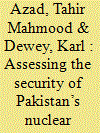

|
|
|
|
|
| Summary/Abstract |
Although the broad outlines of Pakistan's nuclear weapons' programme are well documented, significant gaps remain in the understanding of the country's nuclear security regime. Nuclear security remains a highly politicised topic, with little robust information available regarding the steps taken to secure the country's nuclear assets. To help “fill the gaps”, this paper places official Pakistani documents, statements, and other open source information, into an analytical framework based on international standards of physical security. Although gaps in understanding remain, this paper finds that, in general, Pakistan has enacted robust security measures to protect its nuclear weapons and nuclear-weapons related infrastructure. Nonetheless, the prevailing perception of Pakistan's nuclear security remains dominated by embarrassing episodes that emphasise the importance of effective nuclear security culture. Based on its findings, this paper also offers policy recommendations which may offer additional confidence about the rigours of the country's nuclear security regime.
|
|
|
|
|
|
|
|
|
|
|
|
|
|
|
|
| 3 |
ID:
165202
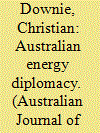

|
|
|
|
|
| Summary/Abstract |
While Australia is considered an energy superpower, Australian foreign policy has often overlooked energy diplomacy. Given the transformations taking place in global energy markets, the time is ripe to begin a policy discussion in Australia on energy diplomacy. I argue that Australian diplomatic efforts should broaden beyond a historical focus on promoting fossil fuels and securing export markets, to driving global energy governance reforms through the G20. This will not only help to ensure that the international energy architecture is capable of achieving governance objectives around energy security, energy access and climate change, but significantly, it will also help Australia to achieve broader foreign policy goals, such as ensuring emerging economies become responsible stakeholders within the international system.
|
|
|
|
|
|
|
|
|
|
|
|
|
|
|
|
| 4 |
ID:
169798
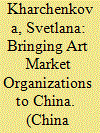

|
|
|
|
|
| Summary/Abstract |
This study proposes a new explanation for institutional differences of organizations in China. It focuses on how two organizational forms dominant in contemporary art markets – commercial galleries and auction houses – were first established in China in the 1990s. Based on archival and interview data, it argues that the organizational forms were introduced to China due to mimetic isomorphism, and that their divergences from the foreign models are the result of unintended consequences of institutional work. It highlights the role of individual agency, including the role of foreign nationals, in organization-building in China. The findings also have implications for institutional theory: the article shows how the political, cultural and institutional context in China shaped institutional work that needed to be conducted and led to unintended consequences of institutional work.
|
|
|
|
|
|
|
|
|
|
|
|
|
|
|
|
| 5 |
ID:
169792
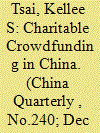

|
|
|
|
|
| Summary/Abstract |
Social media in China has not only become a popular means of communication, but also expanded the interaction between the government and online citizens. Why have some charitable crowdfunding campaigns had agenda-setting influence on public policy, while others have had limited or no impact? Based on an original database of 188 charitable crowdfunding projects currently active on Sina Weibo, we observe that over 80 per cent of long-term campaigns do not have explicit policy aspirations. Among those pursuing policy objectives, however, nearly two-thirds have had either agenda-setting influence or contributed to policy change. Such campaigns complement, rather than challenge existing government priorities. Based on field interviews (listed in Appendix A), case studies of four micro-charities – Free Lunch for Children, Love Save Pneumoconiosis, Support Relief of Rare Diseases, and Water Safety Program of China – are presented to highlight factors that contributed to their variation in public outcomes at the national level. The study suggests that charitable crowdfunding may be viewed as an “input institution” in the context of responsive authoritarianism in China, albeit within closely monitored parameters.
|
|
|
|
|
|
|
|
|
|
|
|
|
|
|
|
| 6 |
ID:
168392


|
|
|
|
|
| Summary/Abstract |
A firestorm of protest greeted revelations of the rendition program when it was made public during the George W. Bush administration. The operational and political basis for the rendition initiative, however, had been established years before George W. Bush became president and was viewed as 'a new art form' by the Clinton administration. Despite significant efforts to distinguish between the two administrations, the evolution of the rendition initiative during the 1990s reveals far greater continuity than has been widely acknowledged. This paper examines the manner in which the Clinton administration utilized rendition in its own war on terror, years before George W. Bush came to power, with little public scrutiny or outrage.
|
|
|
|
|
|
|
|
|
|
|
|
|
|
|
|
| 7 |
ID:
169954


|
|
|
|
|
| Summary/Abstract |
China has traditionally had close relations with Central Asia for quite a long time. The main reasons for this are probably their social, cultural, and demographic bonds, as well as geographical proximity, providing China with a different status in Central Asia from those of the other regions in the world. These bonds have also been strengthened by the ancient Silk Road, beginning in China and passing through Central Asia and Iran towards Europe. Cultural relations, in general, and China’s attempt to expand its means of soft power in the region, in particular, have been a significant aspect of the ties between China and the Central Asian countries. It has drawn attention, especially over the recent decade, and has manifested in various forms. By focussing on the dimension of relations between China and the Central Asian countries, this article addresses the question of what does China try to achieve by expanding its soft power in Central Asia? The article argues that China has focussed on the expansion of its soft power and the consolidation of cultural ties with the Central Asian countries to expand its influence in the region and, eventually, to rise as a new centre of power in the international system. Following a conceptual discussion on the definition of soft power, the article analyses the status of soft power in China’s foreign policy and then, the representations of China’s soft power in Central Asia. Finally, the essay discusses the effects of the soft power factor on the expansion of Chinese influence in the region.
|
|
|
|
|
|
|
|
|
|
|
|
|
|
|
|
| 8 |
ID:
166614
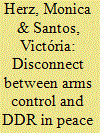

|
|
|
|
|
| Summary/Abstract |
The article discusses the disconnect between arms control and disarmament practices vis-à-vis peacebuilding practices. It critically analyzes Disarmament, Demobilization, and Reintegration (DDR) practices focusing on their absence of dialogue with international arms control and disarmament (ACD) practices. It proposes that a conversation between experts involved in these distinct practices could promote a political discussion on the place of weapons held by state and non-state actors in times of peace. The argument is illustrated through an analysis of the treatment of rules on weapons in the Colombian peace process (2012–present) with the Revolutionary Armed Forces of Colombia (FARC). The article concludes that the disconnect between the arms control and disarmament and the peacebuilding associations, as seen in the context of DDR practices, reinstates the rule on the monopoly of violence by the state, preventing a broader discussion of the role of weapons and violence in the building of political communities.
|
|
|
|
|
|
|
|
|
|
|
|
|
|
|
|
| 9 |
ID:
165904
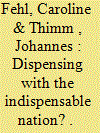

|
|
|
|
|
| Summary/Abstract |
Since entering office, US president Trump has reversed key multilateral achievements of his predecessors, initiating a new US retreat from multilateral cooperation. For other governments wishing to preserve and deepen existing global agreements, this has posed the question of whether and how multilateral cooperation can work without the leadership and support of the dominant global power. International relations scholars have already debated the possibility of “nonhegemonic cooperation” in earlier periods marked by US unilateralism. This article draws on these previous analyses to evaluate the current prospects and limits of a “multilateralism minus one” in three key global policy areas: nuclear arms control, climate change, and trade.
|
|
|
|
|
|
|
|
|
|
|
|
|
|
|
|
| 10 |
ID:
178880
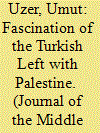

|
|
|
|
|
| Summary/Abstract |
This study analyzes the ideology and worldview of Turkish and some Kurdish militants of the Turkish socialist movement from the late 1960s until the early 1980s based on the memoirs of the protagonists. In these writings, we can observe the exuberance as well as the disappointments of these young militants and their approach to world affairs in general and Turkish and Middle Eastern politics in particular. In their worldview, America and its allies, especially Israel, were the real enemy whereas they purported to aspire to the creation of a socialist state in Turkey. The Turkish left-wing militants got involved in Palestinian politics through their training at the Palestinian camps in Lebanon, Syria, and Jordan as they perceived the Palestinian struggle against Israel as a part of the world-wide revolutionary movement for the overthrow of imperialism and its replacement by socialist governments all around the globe.
|
|
|
|
|
|
|
|
|
|
|
|
|
|
|
|
| 11 |
ID:
174805


|
|
|
|
|
| Summary/Abstract |
The main aim of this article is to develop a discussion on folklorization or how identity is commodified and reduced to only some cultural traits. Currently, folklorization is one of the main devices in PRC’s cultural and political policies in Central Asia. Authors analyze folklorization both inter-state with a particular focus on Kazakhstan and Kyrgyzstan, and intra-state, with focus on Xinjiang, based on empirical data collected in these countries. The discussion provided is about China’s soft power and how it is projected to Central Asia under the administration of Xi Jinping. Moreover, it is concerned about folklorization as a political tool, utilized by the PRC government to mitigate tensions in the Xinjiang region, but also folklorized landscapes to be found also in Kyrgyzstan and Kazakhstan.
|
|
|
|
|
|
|
|
|
|
|
|
|
|
|
|
| 12 |
ID:
181197
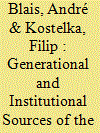

|
|
|
|
|
| Summary/Abstract |
Why has voter turnout declined in democracies all over the world? This article draws on findings from microlevel studies and theorizes two explanations: generational change and a rise in the number of elective institutions. The empirical section tests these hypotheses along with other explanations proposed in the literature—shifts in party/candidate competition, voting-age reform, weakening group mobilization, income inequality, and economic globalization. The authors conduct two analyses. The first analysis employs an original data set covering all post-1945 democratic national elections. The second studies individual-level data from the Comparative Study of Electoral Systems and British, Canadian, and US national election studies. The results strongly support the generational change and elective institutions hypotheses, which account for most of the decline in voter turnout. These findings have important implications for a better understanding of the current transformations of representative democracy and the challenges it faces.
|
|
|
|
|
|
|
|
|
|
|
|
|
|
|
|
| 13 |
ID:
183262
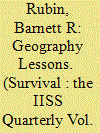

|
|
|
|
|
| Summary/Abstract |
The United States’ Pacific-centric perspective on Asia has kept it from fully appreciating the relative decline of US power in continental Asia west of China, which the US withdrawal from Afghanistan illuminates. During the 20-year US intervention there, the combined economies of the countries surrounding Afghanistan grew from five-sixths the size of the US economy to almost twice its size. China’s massive Belt and Road Initiative responds to genuine needs in the region. The United States’ Build Back Better World (B3W) programme appears insufficient to offset it. Since the US became a global power, it has not faced a peer competitor comparable to China. Washington needs to cooperate with Beijing on connectivity, climate security and regional security in Central and Northeast Asia, even while challenging it on Taiwan, the South China Sea, trade and human-rights issues.
|
|
|
|
|
|
|
|
|
|
|
|
|
|
|
|
| 14 |
ID:
166140


|
|
|
|
|
| Summary/Abstract |
There are differing views on the strengths and weaknesses of faith-based organizations relative to secular international nongovernmental organizations. This article argues that the theory of comparative advantage and the theory of organizational alignment are inadequate in helping to assess these strengths and weaknesses. The article offers a different perspective, called conduit engagement theory. It holds that humanitarian organizations naturally have specific relationships, organizational linkages, affiliations, or shared philosophies (referred to in the article as conduits) that enable certain programmatic interventions. Maximum effectiveness within the humanitarian marketplace is a function of the robustness of engagement of conduits with high-priority initiatives that have adequate funding over the necessary length of time. A new kind of tool for strategic planning within specific countries and for auditing at an organizational level are proposed.
|
|
|
|
|
|
|
|
|
|
|
|
|
|
|
|
| 15 |
ID:
187312


|
|
|
|
|
| Summary/Abstract |
The UK response to the Salisbury poisoning attacks of 2018 was a triumph and provides valuable lessons in information advantage and grey-zone competition for the national security establishment. From the poisoning of the Skripals in March to the unravelling of the GRU’s operations in October, the UK conducted a phased, managed confrontation, reaching a defined end state. Characterised by the need to establish clarity, authority and authenticity, the UK used an ‘elastic communications strategy’, which blunted Kremlin disinformation and leveraged the full spectrum of government powers into a potent ‘second strike’ communications response. The case demonstrates that successful and innovative grey-zone competition can be achieved without sacrificing moral authority.
|
|
|
|
|
|
|
|
|
|
|
|
|
|
|
|
| 16 |
ID:
182553
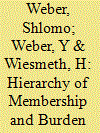

|
|
|
|
|
| Summary/Abstract |
We examine a military alliance with heterogeneous members that finances the production of the ‘alliance good’ (defense, deterrence, and peacekeeping) through its members’ voluntary contributions. To examine the patterns of those contributions, we introduce a decision-making model with three layers of hierarchy: one ‘super-leader’, a group of ‘leaders’, and several ‘followers’, which takes into account different economic and historical backgrounds of member states. The asymmetric interaction between the members is reflected by the choice of Stackelberg paradigm where the sequence of countries’ moves is determined by their alliance status. We then apply Penrose’s Law to incorporate countries’ heterogeneous population sizes in our model and show the existence of a unique Penrose-Stackelberg equilibrium. We apply our results to NATO and offer an empirical evaluation of burden sharing across the alliance by showing how economic characteristics, alliance ‘awareness’, and the alliance status explain the patterns of members’ contributions. We also evaluate the optimal fit between the data and an appropriate choice of the alliance’s hierarchical structure.
|
|
|
|
|
|
|
|
|
|
|
|
|
|
|
|
| 17 |
ID:
173914


|
|
|
|
|
| Summary/Abstract |
Recently there have been calls from policymakers around the world for practically engaged research to produce evidence-based policy for peace, security and development. Policymakers aim to align three types of methodological approaches to knowledge about peace, security and development in international order: methodological liberalism at state and international levels, aligned with ‘methodological everydayism’ in order to constrain methodological nationalism. Policy operates through broad forms of intervention, spanning military, governmental and developmental processes, which scholarship is expected to refine. Critical scholarship is sensitive about the subsequent ‘interventionary order’, often connecting methodological everydayism with global justice frameworks rather than methodological nationalism or liberalism.
|
|
|
|
|
|
|
|
|
|
|
|
|
|
|
|
| 18 |
ID:
170242
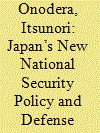

|
|
|
|
|
| Summary/Abstract |
The security environment in Northeast Asia is changing dramatically and rapidly. Even more concerning than the North Korea issue is China’s strengthening of military power and activity. The author, a member of the House of Representatives of the National Diet of Japan and two-term Minister of Defense until October 2018, discusses recent developments in the region in terms of new methods of warfare, competition for technological hegemony, and Japan’s defense program. The article analyzes key relationships in the region, including the US-China relationship, the Japan-China relationship, and the Japan-Korea relationship and provides the author’s views of how best to manage these relationships in the mid- to long-term. This article is based on remarks delivered on March 6, 2019 for US–Japan LINK, a non-profit organization based in Tokyo.
|
|
|
|
|
|
|
|
|
|
|
|
|
|
|
|
| 19 |
ID:
170462


|
|
|
|
|
| Summary/Abstract |
NATO’s 1999 Kosovo campaign was a pivotal moment in Russia’s worldview and its post–Cold War evolution, prompting an enduring period of estrangement and alienation from the West. It has had a profound and lasting impact on Russian policy and strategic thought vis-à-vis the international system and the use of force, as well as the balance of power amongst different sections of the country’s foreign policy elite. This article focuses on the enduring consequences of NATO’s intervention for relations between Russia and the West, as well as on how the operation has shaped Russian strategic thought and its views on the character of conflict in the twenty-first century. It explores three themes that emerged in the wake of Operation Allied Force: questions over European security, specifically how it is provided and by whom, as well as Russia’s role; challenges to the existing liberal international order and the norms underpinning it; and the evolution of Russian military thought and defense policy post-1999.
|
|
|
|
|
|
|
|
|
|
|
|
|
|
|
|
| 20 |
ID:
169130
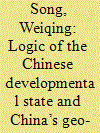

|
|
|
|
|
| Summary/Abstract |
This study addresses China’s cooperation with Central and Eastern European (CEECs) countries, centred around what is popularly known as the ‘16 + 1’ process. It aims to unravel the link between China’s domestic sources and its ambition to become an international leader in the global economic order and governance related to Central and Eastern Europe (CEE). It argues that China’s economic expansion to faraway regions like CEE is a necessary outgrowth of its developmental state model, both economically and politically. The nature of this model has largely dictated China’s way of engaging the CEE region and its concomitant outcomes and responses. Although the era of globalisation has afforded China good opportunities to expand in the global economic domain, it has found itself substantially constrained by diverse factors, both domestic and external. Despite some notable progress, this complexity requires China to generate feasible strategic choices if it wishes to succeed in its global economic endeavours. Given that China must adapt to the outside world, its foreign partners should in turn accommodate China in this globalised world.
|
|
|
|
|
|
|
|
|
|
|
|
|
|
|
|
|
|
|
|
|